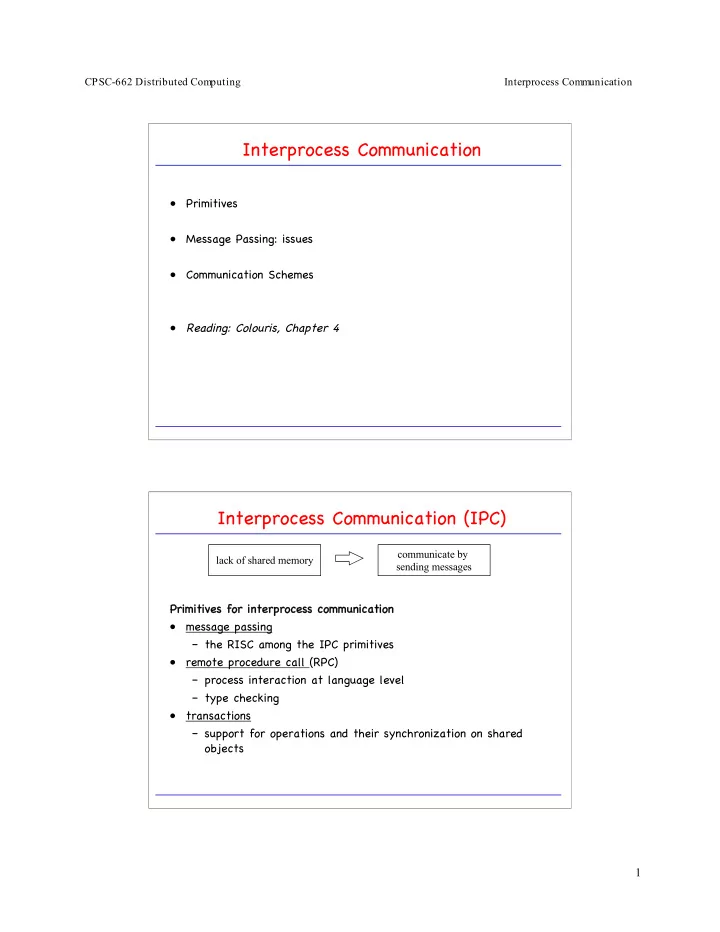

CPSC-662 Distributed Computing Interprocess Communication Interprocess Communication • Primitives • Message Passing: issues • Communication Schemes • Reading: Colouris, Chapter 4 Interprocess Communication (IPC) communicate by lack of shared memory sending messages Primitives for interprocess communication • message passing – the RISC among the IPC primitives • remote procedure call (RPC) – process interaction at language level – type checking • transactions – support for operations and their synchronization on shared objects 1
CPSC-662 Distributed Computing Interprocess Communication Message Passing • The primitives: send expression_list to destination_identifier; receive variable_list from source_identifier; • Variations: guarded receive: receive variable_list from source_id when B; selective receive: select receive var_list from source_id1; | receive var_list from source_id2; | receive var_list from source_id3; end Semantics of Message-Passing Primitives • blocking vs . non-blocking • buffered vs . unbuffered • reliable vs . unreliable • fixed-size vs . variable-size messages • direct vs . indirect communication 2
CPSC-662 Distributed Computing Interprocess Communication Blocking vs. Non-Blocking Primitives blocking non-blocking Returns control to user Returns control as soon as only after message has message queued or copied. been sent, or until send acknowledgment has been received. Returns only after message Signals willingness to has been received. receive message. receive Buffer is ready. • Reduces concurrency. • Need buffering: • still blocking problems • deadlocks! • Tricky to program. Buffered vs. Unbuffered Primitives • Asynchronous send is never delayed – may get arbitrarily ahead of receive . • However: messages need to be buffered. • If no buffering available, operations become blocking, and processes are synchronized on operations: rendezvous. invoke accept invoke copy input parms copy input parms entry on entry entry accept on entry rendezvous rendezvous copy output parms copy output parms 3
CPSC-662 Distributed Computing Interprocess Communication Reliable vs. Unreliable Primitives • Transmission problems: corruption loss duplication reordering • Recovery mechanism: Where? • Reliable transmission: acknowledgments send send time-out time-out receive receive • At-least-one vs. exactly-one semantics inc(A) inc(A) A = 0 A = 0 request table A = 1 inc(A) A = 1 inc(A) deja-vu! A = 1 A = 2 Direct vs. Indirect Communication • Direct communication: send (P, message) receive (Q, message) • Variation thereof: send (P, message) receive (var, message) send(S, msg 1 ) C 1 receive(&client_id, &msg) S server receive(&client_id, &msg) C 2 send(S, msg 2 ) 4
CPSC-662 Distributed Computing Interprocess Communication Indirect Communication • Treat communication paths as first-class objects. • Example: Mailboxes send(M, msg 1 ) receive(M, &msg) send(M, msg 1 ) receive(M, &msg) send(M, msg 1 ) .... mailbox M Indirect Communication (2) • Example: Accent (CMU) • multiple senders • only one receiver send(P, msg1) Process • access to port is FIFO queue passed between send(P, msg2) processes in form of capabilities Port P receive(P, &msg) 5
CPSC-662 Distributed Computing Interprocess Communication Communication Schemes one-to-one unicast one-to-many multicast many-to-one many-to-many 6
Recommend
More recommend